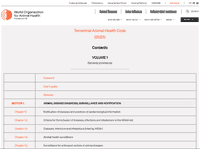
Languages: English, Spanish, French
Terrestrial Animal Health Code
[Terrestrial Code]
The Terrestrial Animal Health Code provides international standards for the improvement of animal health and veterinary public health efforts. Veterinary authorities should use these standards to establish systems for early detection, internal reporting, notification, and control of pathogenic agents in terrestrial animals.
SUMMARY
The Terrestrial Animal Health Code from the World Organisation for Animal Health (WOAH) provides standards for animal health and veterinary public health worldwide. The standards in this code ensure the safety of international trade in animals and animal products and establish measures for the reporting, prevention, and control of pathogenic agents. This code is a key component of the WTO legal framework for international trade. These standards may be useful for members of veterinary and public health services and officials involved in the international trade of animals.
The development of new and revised standards for the Terrestrial Animal Health Code is the responsibility of the WOAH Terrestrial Animal Health Standards Commission (the Code Commission). The Code Commission has six elected members and draws up the expertise of internationally renowned experts. Comments from WOAH members on the code are solicited twice a year when new or revised texts are made available. The year that a chapter was first adopted and the year of the chapter’s last revision are both included at the end of each chapter. The complete text of the Terrestrial Code is available on the WOAH website and individual chapters may be downloaded from the site. The Code is available in English, French, and Spanish.
WOAH, founded as OIE, is an intergovernmental organization with 182 member countries. The organization is responsible for safeguarding and improving animal health worldwide. WOAH receives its mandate from the World Trade Organization (WTO) Agreement on Sanitary and Phytosanitary Measures. It also maintains permanent relations with nearly 75 other international and regional organizations.

..png)
